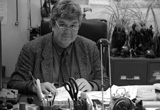 The nature of our departures from our work often tells us much about what kind of problems are being left behind. The individual may escape, but what about the wider community?
The nature of our departures from our work often tells us much about what kind of problems are being left behind. The individual may escape, but what about the wider community?
The continuing troubles and discontents of junior doctors have evident newsworthiness; not so the equivalent problems in later careers. This is easy to understand: younger doctors have (we hope) a long future career ahead—that future is also our future healthcare, so we want them to be there, and in fine fettle. Older doctors will have retired from that picture: we are less concerned.
So, the morale and welfare of older doctors does not arouse the same kind of public interest or apprehension. Yet older doctors have much to tell us about our direction of travel: they have witnessed and practised many kinds of care and treatment, management and collegiality, ethos or its lack. Surely, the story and state of our elders’ retirement conveys much about the developing trends in our healthcare culture and, therefore, what we may expect in the future.
Throughout my long NHS career I have talked with many doctors about their retirement. In previous decades the better ones (and there were many) left their work often in incremental stages—with much grace, gratitude, dignity, charity, and affectionate appreciation. Importantly, this was reciprocal: the sentiments would resonate between their community of colleagues and staff. “The demands have often been difficult but our shared human rewards are rich. Thank you everybody” was a common departing coda.
In the past decade such departures have become very rare. Retirement mindsets now are increasingly of wearied stoicism or sourness: either “Well, I’ve made it to 60, thank goodness. I just hope there’s enough of me left to restore the rest of my life,” or “I’m 56 but my pension is now good enough to go early. I just don’t enjoy my work as I did. Not only can I not care for people like I used to, but I don’t feel cared for when I’m doing the work. Community?! I have become just a cog in The Machine.”
Less common—though previously almost unheard of—is the rapid and dramatic exit: the coup de grace of redundancy, decommissioning, CQC closure, or contractual expulsion. Such are quotidian traumas in the realms of business, politics, and sports management. Yet the everyday observation of how doctors are now increasingly liable to such denouements tells us much about our changed healthcare culture.
If our retirement patterns are any kind of litmus test to predict our profession’s future, then junior doctors’ concerns will extend far beyond current disputes about pay and working hours.
Why do older doctors now become so enervated and disillusioned? What was different in previous decades? We can start to explain by considering this cluster of losses: the loss of time to care for and relate to both patients and colleagues; the resulting loss of headspace and heartspace to nurture human meaning and relationships; the inevitable loss of fraternal collegiality; the loss of the primacy of personal skills, understanding, and trust to guide our work’s best decisions and conduct.
These are all losses to our humanity: the nourishment, stimulus, and satisfactions we garner, exchange, and recycle so that people can get to know and care about one another.
But how have we lost these things? These losses may be best understood as consequences of displacement. For our insistence on quantifiable, standardised, executable procedures has increasingly pushed out the innumerable, yet invaluable, aspects of our humanity that cannot be processed in this way. Deprived of its natural habitat our professional humanity first ails, then eventually dies. This is what the fractious unrest of junior doctors, and the caustic fatigue of retiring doctors, is telling us: we have—by overmanagement and excessive proceduralisation—created a world of work inimical to healthy and fulfilled lives.
With the rise of the internal market, corporate managerialism, and then the four Cs—competition, commissioning, commodification, and computerisation—we have created a network of factories in our NHS. In these, workers do what they are told: there is a cascade of executive instructions flowing from planners, designers, production engineers, production managers, performance managers, etc. The workers’ conduct and skills are defined, confined, boundaried, contracted, and disciplined by executive decree. Autonomous professional judgment, wisdom, intelligence, or experience become inadmissible, then obsolete.
This is the managed world, increasingly, that doctors are working in: from family to factory; from being guided by vocation to being controlled by corporation.
Our current retirement patterns tell us we are destroying the human heart of healthcare. That, surely, leads us to very bleak scenarios.
What can we do to avoid such a debacle? We might start by asking this kind of question: “how do we best understand one another’s human needs?”, rather than “how do we control all these other people?”
David Zigmond is a GP in London.
Competing interests: I declare that I have read and understood BMJ policy on declaration of interests and I have no relevant interests to declare.
Many articles exploring similar themes are available via David Zigmond’s home page on www.marco-learningsystems.com
David Zigmond would be pleased to receive feedback.
